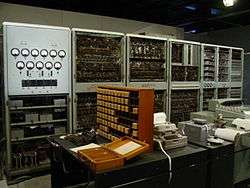Paul Lansky
Paul Lansky (born June 18, 1944, in New York) is an American electronic-music or computer-music composer who has been producing works from the 1970s up to the present day.
Biography
A former student of George Perle, he is currently a professor of music composition at Princeton University, and in addition to his music is known as a pioneer in the development of computer music languages for algorithmic composition (see Real-Time Cmix). He is also a former student of Milton Babbitt and Edward Cone.
Lansky's first album, Smalltalk, was not released until 1990. It features four tracks, two covering aspects of the human voice, and two looking at two styles of music (metal and harmonica).
His second album, Homebrew (1992), contains five tracks, including the percussive and aural 18-minute piece "Table's Clear," which features samples of his children playing kitchen utensils. Following that came More Than Idle Chatter, the six compositions of which focus on processings of the human voice using linear predictive coding, granular synthesis, and plucked string synthesis; its three highlights are granular synth pieces called "Idle Chatter," "Just_more_idle_chatter," and "Notjustmoreidlechatter," which look at the same thing from multiple perspectives. In 1994, he released Fantasies and Tableaux, a collection of two earlier works, "Six Fantasies on a Poem by Thomas Campion" and "Still Time." 1995 brought Folk Images, Lansky's personal interpretation and reworking of a "good few folk songs."
At around this point there was a change in the style of Lansky's music that made it sound slightly more modern, and 1997 heralded a one-hour computer opera titled Things She Carried, a musical portrait about an unnamed woman in a series of eight movements. During the following year, Conversation Pieces was released.
In early 2001 the CD Ride was released, featuring a new addition to the Idle Chatter family: "Idle Chatter Junior" and the 19-minute title piece, which tries to simulate a ride through various towns and country. In the spring of 2006, Lansky took an old folk song and various ingredients of hip hop music and created "Chatter of Pins." In 2008 "Chatter of Pins" was included on the compilation album Crosstalk: American Speech Music (Bridge Records) produced by Mendi + Keith Obadike.
Recently, Lansky has shifted his focus away from electronic and computer music to invest more time in composing for acoustic instruments. He has written new acoustic works for David Starobin, So Percussion, Nancy Zeltsman, and the Alabama Symphony Orchestra.
The Radiohead song "Idioteque", from their 2000 album Kid A, features a prominent sample from Lansky's computer tape piece "Mild und Leise" (1973). The sample, four looping chords taken from a few seconds of Lansky's piece, provides the entire harmony for the song. The name "Mild und Leise" comes from the opening lines of Liebestod, the climatic ending of Richard Wagner's opera "Tristan und Isolde"s. Lansky has written an essay about Radiohead that appears in The Music and Art of Radiohead and he has written a short note online inviting listeners to identify where the sample is taken from in the original piece.[1] Lansky's 1979 computer music piece "Her Song", from the Six Fantasies On A Poem By Thomas Campion (re-released on the album Fantasies and Tableaux, 1994), has also been sampled by Caural for his song "I Won't Race You", from his 2006 album Mirrors For Eyes, with the main synthesized vocal line of Lansky's piece being used (and being the basis for the title of the latter).
Discography
- Smalltalk, 1990 (New Albion Records 030)[2]
- Homebrew, 1992 (Bridge Records 9035)[3]
- More Than Idle Chatter, 1994 (Bridge 9050)
- Fantasies And Tableaux, 1994 (Composers Recordings, Inc. 683)[4]
- Folk Images, 1995 (Bridge 9060)
- Things She Carried, 1997 (Bridge 9076)
- Conversation Pieces, 1998 (Bridge 9083)
- Ride, 2001 (Bridge 9103)
- Alphabet Book, 2002 (Bridge 9126)
- Music Box, 2006 (Bridge 9210)
- Etudes and Parodies, 2007 (Bridge 9222)
- Threads, 2011 (Cantaloupe Music 21064)[5]
- Imaginary Islands, 2012 (Bridge 9366)
- Notes to Self, 2013 (Bridge 9405)
- Textures and Threads, 2014 (Bridge 9435)
- Contemplating Weather,2015 (Bridge 9447)
- Idle Fancies, 2015 (Bridge 9454)
See also
References
Sources
- Antokoletz, Elliott. 2001. "Lansky, Paul". The New Grove Dictionary of Music and Musicians, second edition, edited by Stanley Sadie and John Tyrrell. London: Macmillan Publishers.
- Code, David L. 1990. "Observations in the Art of Speech: Paul Lansky’s Six Fantasies". Perspective of New Music 28, no. 1 (Fall): 144–69.
- Roads, Curtis. 1983. "Interview with Paul Lansky". Computer Music Journal 7, no. 3:16–24.
External links
| Wikiquote has quotations related to: Paul Lansky |
- Paul Lansky's Homepage on Princeton.edu
- MP3 of Mild und Leise
- NewMusicBox.org: In the 1st Person : Three Generations of Teaching Music Composition with George Perle and Virgil Moorefield
- Short biography and a photo
- Archived article and interview with Lansky from a defunct music website, "soundout"
- Listen to Lansky's "Notjustmoreidlechatter" at Acousmata music blog
